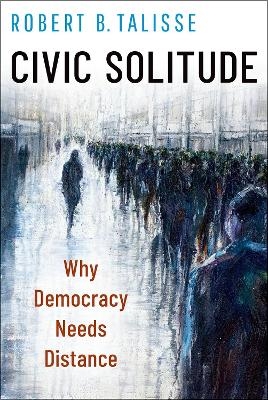
Civic Solitude
Why Democracy Needs Distance
Seiten
2025
Oxford University Press Inc (Verlag)
978-0-19-775216-6 (ISBN)
Oxford University Press Inc (Verlag)
978-0-19-775216-6 (ISBN)
- Noch nicht erschienen (ca. Januar 2025)
- Versandkostenfrei innerhalb Deutschlands
- Auch auf Rechnung
- Verfügbarkeit in der Filiale vor Ort prüfen
- Artikel merken
An internet search of the phrase "this is what democracy looks like" returns thousands of images of people assembled in public for the purpose of collective action. But is group collaboration truly the defining feature of effective democracy? Robert B. Talisse suggests that while group action is essential to democracy, action without reflection can present insidious challenges, as individuals' perspectives can be distorted by group dynamics.
The culprit is a cognitive dynamic called belief polarization. As we interact with our political allies, we are exposed to forces that render us more radical in our beliefs and increasingly hostile to those who do not share them. What's more, the social environments we inhabit in our day-to-day lives are sorted along partisan lines. We are surrounded by triggers of political extremity and animosity. Thus, our ordinary activities encourage the attitude that democracy is possible only when everyone agrees--a profoundly antidemocratic stance.
Drawing on extensive research about polarization and partisanship, Talisse argues that certain core democratic capacities can be cultivated only at a distance from the political fray. If we are to meet the responsibilities of democratic citizenship, we must occasionally step away from our allies and opponents alike. We can perform this self-work only in secluded settings where we can engage in civic reflection that is not prepackaged in the idiom of our political divides, allowing us to contemplate political circumstances that are not our own.
The culprit is a cognitive dynamic called belief polarization. As we interact with our political allies, we are exposed to forces that render us more radical in our beliefs and increasingly hostile to those who do not share them. What's more, the social environments we inhabit in our day-to-day lives are sorted along partisan lines. We are surrounded by triggers of political extremity and animosity. Thus, our ordinary activities encourage the attitude that democracy is possible only when everyone agrees--a profoundly antidemocratic stance.
Drawing on extensive research about polarization and partisanship, Talisse argues that certain core democratic capacities can be cultivated only at a distance from the political fray. If we are to meet the responsibilities of democratic citizenship, we must occasionally step away from our allies and opponents alike. We can perform this self-work only in secluded settings where we can engage in civic reflection that is not prepackaged in the idiom of our political divides, allowing us to contemplate political circumstances that are not our own.
Robert B. Talisse is W. Alton Jones Professor of Philosophy at Vanderbilt University. His research focuses on democracy and the demands of responsible citizenship. He is the author of Overdoing Democracy (OUP, 2019) and Sustaining Democracy (OUP, 2021).
| Erscheint lt. Verlag | 8.1.2025 |
|---|---|
| Verlagsort | New York |
| Sprache | englisch |
| Maße | 149 x 212 mm |
| Gewicht | 327 g |
| Themenwelt | Geisteswissenschaften ► Philosophie ► Ethik |
| ISBN-10 | 0-19-775216-0 / 0197752160 |
| ISBN-13 | 978-0-19-775216-6 / 9780197752166 |
| Zustand | Neuware |
| Informationen gemäß Produktsicherheitsverordnung (GPSR) | |
| Haben Sie eine Frage zum Produkt? |
Mehr entdecken
aus dem Bereich
aus dem Bereich


